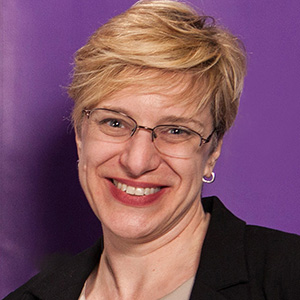Lora Becker, PhD
Neuroscience

Get to Know Lora Becker, PhD, professor of psychology and director of the neuroscience program through these series of short videos.
Available Videos
- What Lora Becker is excited about in the field of neuroscience.
- What Lora likes to do if she has downtime.
- Why Lora Becker enjoys being a faculty member at UE.
- Why Lora Becker chose neuroscience as her specialty.
- How UE neuroscience students are prepared to change the world.
- The student journey for UE neuroscience majors.
- Lora Becker shares her 'aha' moment in the classroom.
Can magnesium boost brain function and learning ability? How do specific drugs effect the brain? Do we respond differently when asked to do something for a friend, versus being asked by a stranger? These are all questions that Dr. Lora Becker’s students are working to answer through abundant research opportunities within the Department of Neuroscience at the University of Evansville.
Becker has been influential in developing the Department of Neuroscience here at UE. She has had strong involvement in developing a curriculum that will give students an edge upon graduation.
“Whether they decide to go into industry, into medicine, or on to pursue graduate work in psychology, our students will need proven experience in the field.”
This, she says, is why the program was specifically designed around a heavy focus on experiential opportunities. “By having a research and internship class as a required part of the major, students in our program are assured to get the hands-on experiences to give them an advantage.”
In addition to the research and internship classes, Becker helped to expand the neuroscience curriculum to include a special topics class. This course provides individualized learning opportunities for students with varied interests.
“Special topics courses allow us to give students access to subjects not currently in the course catalog. We can provide individual or group studies focused on areas of interest to our students. Those taking a special topics course have chosen to learn about a wide variety of things including drugs and behavior or the effects of traumatic brain injury.”
Becker says the caliber of student at the University of Evansville really enhances the learning environment for the student body as a whole.
She points to one stand-out student in particular who has excelled both in and outside of the classroom. “Evan Meiman is a great example of a well-rounded UE student,” she says. “He was the president of his fraternity as a sophomore, he’s involved with College Mentors for Kids, he’s a leader among his peers, a great student in class. He’s also strongly involved with the Nu Rho Psi, the national honors society for neuroscience and even presented data along with another of our students at the national conference in Washington DC which had over 31,000 attendees.”
The honors society is another asset unique to the program at UE. The chapter at UE is the first and only chapter in Indiana and Kentucky, and there are only 40 chapters across the US. Becker, who is the vice president for the Nu Rho Psi honors society national council, says, “it is a very prestigious society, and the entire program had to be reviewed and accepted to house the honors society on our campus.”
Benefits of the society include travel grants to conferences, networking with professionals in the field, access to graduate school guidance, and even grants to hold special chapter activities. “Our chapter received a teaching grant to introduce elementary kids to neuroscience,” Becker says. “We went to Signature School and Hebron Elementary here in Evansville, and our students had the opportunity to take on a teaching role. They talked about how adaptable the brain is and put kids in vision distortion goggles to illustrate the point.”
Overall, the education and abundant hands-on experiences gained at UE have taken neuroscience graduates down a variety of professional paths. “We’ve had students go on to become academic professors, medical doctors, pharmaceutical researchers, optometrists, and animal lab technicians. Some have gone on for their master’s in sports performance and physiology. Really, a base in neuroscience can fit in anywhere in the medical profession.”
Becker encourages the exploration of a degree in the field. “Neuroscience sounds so daunting, but it’s really approachable. Ultimately, it’s all about the human body, so each and every one of us can personally appreciate what we’re studying.”
